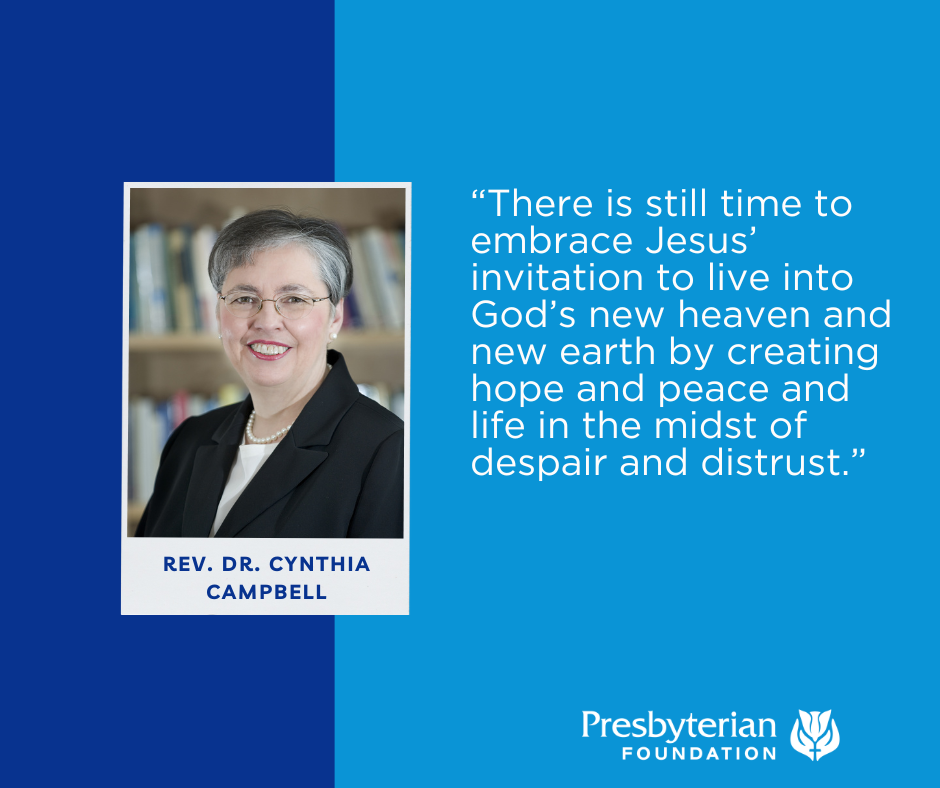8/12/2025
A Month of Parables – September 2025 Lectionary Preview, Year C, Luke 15:3-7, Luke 14:25-33, Luke 15:1-10, Luke 16:19-31
by Rev. Dr. Cynthia Campbell

One of the great things about book clubs is the variety of reactions any given selection is likely to evoke. I may find a certain character very sympathetic, but my neighbor isn’t having it. You see something in a story I would not have noticed without you. Reading with others often elicits new and deeper insights than we might have on our own.
This is certainly true when reading the Bible and especially evident when reflecting on Jesus’ parables. This seems to have been his preferred method of teaching. Like any good storyteller, he probably told the same stories many times to different audiences, thus enabling his closest followers to remember them.
But, as is obvious in the gospel narratives, they (and others) were often perplexed by what he meant. As are we! But it seems to me that is part of the point. Parables are intended to make us ask questions. Why is God’s reign like a mustard seed? How is God’s presence like leaven when mixed with flour and water? You may have one answer; I may have another. Together, especially when we ask the Holy Spirit to be among us, we find our way to (sometimes surprising) meanings.
We ask questions about the stories of Jesus, and they ask questions of us. Who am I in the parable of the man who had two sons? Who are we in the parable of the laborers in the vineyard: the owner? Those who came early? Those who came late? What does the parable ask of us? What demands does it make? All of these questions and more arise as we consider the parables for the four Sundays in September. The stories are varied: two are short; two are long. Some are very familiar; others are downright puzzling. Two have specifically to do with money, but all have to do with priorities.
New Testament scholars generally agree that while the authors of Matthew and Luke take the gospel of Mark as their starting place, they both have access to another source of teachings. In addition, each of them has material that is found nowhere else. With the exception of the Lost Sheep (Luke 15:3-7), which Luke shares with Matthew, all the rest of the parables in the four Sundays of September are unique to Luke. They not only reflect Luke’s concern with wealth, but they are also evidence of his skill at storytelling.

Luke 14:25-33 begins with a theme familiar to all the synoptics: the cost of discipleship. Following Jesus will involve living (and dying) as he did: forsaking the security of family and embracing the cross. But then Luke adds a “double parable” about counting costs. The protagonists are different – a villager who decides to build a house with more than one story (see page 183 in Gerhard Lohfink’s The Forty Parables of Jesus) verses a king setting out to wage war – but the point is the same: before you launch into a bold venture, make sure you have the resources to be successful. Discipleship has a cost. The way of Jesus will not be easy, because his values are more than likely going to conflict with values in the world around us. Are we ready? Have we counted the cost and our resources?
This a very valid reading and fits Luke’s context. But what if we were to extract the parable from the context and read it on its own? Now we have two stories about planning, which is something most of us know a lot about. We plan to purchase a home or remodel it. We plan for retirement. As Presbyterians, we plan all the time! But are we planning for the right things? If life really is more than our possessions (or even our time), are we planning for the right things? If we plan to take care of our material well-being, what of our well-being with God?
The gospel for September 14 is Luke 15:1-10. Once again, Luke gives us a double parable. This time, he contrasts a man and a woman. The shepherd has lost one of his sheep; the woman has lost one of her dowry coins (her only wealth or security). The “tag line” of both is about “repentance,” but that begs a very important question: What did the sheep do that requires repentance? How would a coin “act,” let alone “repent?” In fact, the shepherd lost his sheep, and the woman lost her coin! The focus is on what the two of them choose to do about it. The shepherd leaves the rest of his (very valuable) flock. The woman lights a lamp (in her perhaps window-less, small home) and grabs her broom. They search. They look high and low. And they do not give up until what was lost has been found and restored to where it belongs. Aren’t these stories about divine persistence? Aren’t these suggestions about how far God is ready to go to find us and bring us home? And what about us? How do we go looking for those whom we have lost in our lives, in our communities, in our world?
The third parable in this series is often called “The Parable of the Dishonest Manager,” and it is perhaps one of Jesus’ most perplexing and difficult to understand stories. The lectionary reading includes the parable itself (Luke 16:1-8a) and four sayings of Jesus offered as interpretation or context (v. 8b-13). The interpretive sayings are clear enough (“You cannot serve God and wealth (or riches)”). It’s the parable that’s the problem.
A very rich man (rarely a sympathetic character in Jesus’ stories) has a manager who is responsible for the operation of his farming business. The rich man learns that the manager is, in fact, not managing. We don’t know if he’s actually embezzling or is just wasteful. When the rich man fires him, the manager is in crisis. This is the third parable in which internal dialogue is used to tell us how the crisis will be resolved (see Luke 12:17 and 15:17). “I can’t do manual labor; I won’t beg! But I can figure out how to get my former employer’s clients in my debt!” He calls them in one at a time and deeply discounts what they owe, thus gaining their astonished gratitude. Finally, when the rich man hears of this new scheme, he commends the manager for acting shrewdly!
The “hero” of the story is a crook! What is Jesus thinking??
Tom Long offers a long analysis of various attempts to salvage this story. He suggests that the parable makes sense only in light of Luke’s overall vision that the reign of God is in our midst, here and now. Jesus invites women and men to live into this new reality. He calls them to be “children of light” rather than “children of this age.” Long writes, “This parable is populated entirely with characters who are typical ‘children of this age.’ The rich man, the dishonest manager, even the creditors all live in the present age and play by its rules. Working as a child of that age and as a part of that system, the manager proved to be shrewdest of all by how he responded to the crisis of his world coming apart. Jesus wants a similar shrewdness from the ‘children of light,’ the citizens of the age to come.” (pages 332-333, Thomas G. Long, Proclaiming the Parables of Jesus: Preaching and Teaching the Kingdom of God)
How are we to be “shrewd” with “dishonest wealth” (which Long suggests isn’t money acquired by dishonest means, but money period, simply because it belongs to this age which is passing away)? One answer is that we can use the wealth we have (individually and as faith communities) for the work of God’s reign and realm. That is, we can “invest” in caring for the poor, the unhoused, the vulnerable on the margins of our communities and the world. Because, if “you have not been faithful with the dishonest wealth (the riches and resources of this world), who will entrust to you the true riches?” (v. 11).
Finally, we come to the very familiar parable of the rich man and Lazarus (Luke 16:19-31). This story is unique on several grounds. First, it is the only parable in which a character has a name: Lazarus is the Greek version of “Eliezer,” meaning “God has helped.” Second, the dialogue between Abraham and the rich man is the most extensive in any parable. Third, the descriptions of both Lazarus and the rich man are detailed, vivid, and compelling: the contrast between the two in this life could not be drawn more starkly.
There is no problem understanding this parable. The problem is that we do understand. The rich man simply does not see what is right before his eyes. Every day he goes in and out of his gate. He passes by Lazarus, destitute and diseased. He has everything he needs to provide aid and comfort to Lazarus. He doubtless knows the law of Moses and the demands of the prophets that those who can are obligated to care for the poor, the vulnerable, the sick, and the dispossessed. And he does nothing. His moral blindness is so great that he wants Abraham to send Lazarus to bring him cold water for his parched mouth! The parable ends with an incredible irony: “If they do not listen to Moses and the prophets, neither will they be convinced even if someone rises from the dead” – which we, the readers, know is exactly what the one telling this parable has done.
With every warning, however, comes opportunity. Doesn’t this parable challenge us, first of all, to open our eyes? To look around and see who lives in our neighborhood and what is going on in the world. To ask questions about why our city doesn’t have adequate housing; why many working people cannot afford health care; why our nation has abruptly cut off food aid to starving people; why refugees, carefully vetted by government agencies, are no longer permitted to immigrate and start new lives and contribute to our society. Second, this parable directs us back to Moses and the prophets who taught that acting justly towards neighbors in need is at the heart of right worship of God. There is still time to embrace Jesus’ invitation to live into God’s new heaven and new earth by creating hope and peace and life in the midst of despair and distrust. May this parable encourage us to get started.

